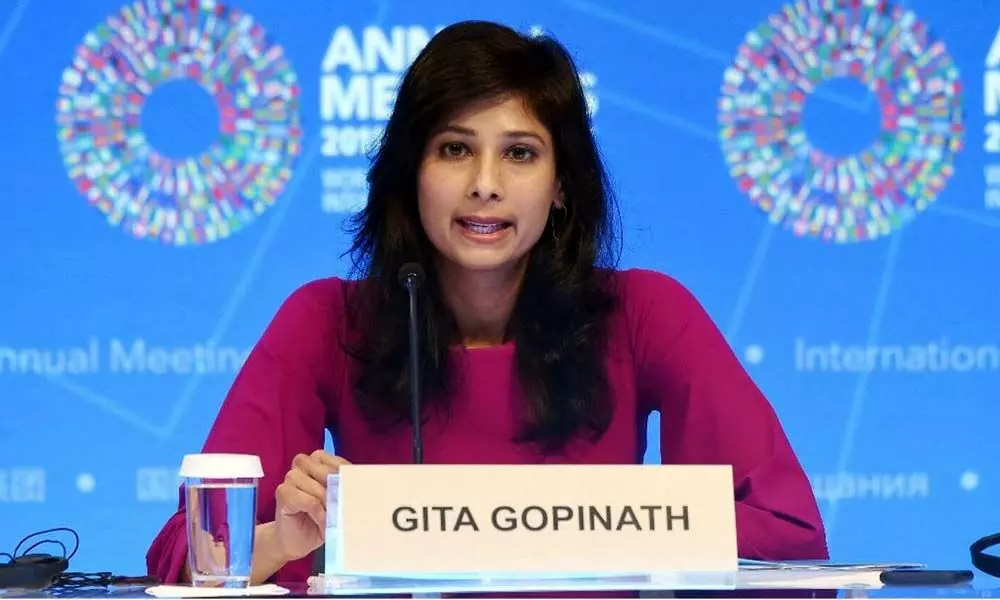Improve health system to tackle Covid-like crisis in future: Gopinath
As the world gradually makes its way out of the coronavirus crisis, IMF Chief Economist Gita Gopinath has said that countries should work on their health system and be ready to provide timely assistance to impacted segments of the society in addition to enhanced global cooperation to be better prepared for addressing such a challenge next time.
image for illustrative purpose

Washington: As the world gradually makes its way out of the coronavirus crisis, IMF Chief Economist Gita Gopinath has said that countries should work on their health system and be ready to provide timely assistance to impacted segments of the society in addition to enhanced global cooperation to be better prepared for addressing such a challenge next time.
The global economy, ravaged by the Covid-19 pandemic, is projected to grow at 5.5 per cent in 2021 and 4.2 per cent in 2022, the International Monetary Fund said this week, reflecting the expectations of a vaccine-powered strengthening of business activities later in the year and additional policy support in a few large economies.
There are three key lessons to be learned from the Covid-19 crisis that has impacted global economic activity, Gopinath told PTI.
"Firstly, countries should prepare their health systems to be ready for any kind of a health crisis. There are many developing countries that need additional investment in their health infrastructure. That is a very important lesson to be learnt," she said.
Gopinath was responding to a question on lessons learnt from the coronavirus pandemic that had a devastating impact on humanity both in terms of health and economy.
"Second lesson is to remember to provide timely assistance to struggling households, businesses. We know that when the recovery has come back we've seen it to be particularly strong whether it's being supported to those who were most deeply hit by it," Gopinath said. Emphasising on greater international cooperation, she said, "It is still needed now for instance in making sure that vaccinations and therapies and anything else that can end the health crisis is available globally. Because otherwise we are not going to be out of this with all these new virus mutations."
"So we have to have a mechanism in place to ensure that countries are actually going to work together to make sure that there is widespread availability of solutions to the health crisis, whatever it is next time," she said.
Pointing that many countries have deployed policy support, she said, "If you look at the magnitudes of it, of course, most of it has happened in advanced economies."Just in terms of numbers of advanced economies have provided a fiscal support of around 24 per cent of their GDP in 2020 and that number for emerging market and middle-income countries is around six per cent, while for low-income countries it goes all the way down to two per cent." Gopinath said these countries differ a lot in the amount of fiscal capacity they have and the amount of financial access they have.
"For instance, we have a significant upgrade for the US for 2021 and that's a reflection of the $900 billion stimulus that was provided at the end of 2020," she said, noting that policy support has played a very important role in several countries. "If you look at the overall recovery, we're seeing very diverging recoveries around the world," she said.
Among the emerging developing economies one of the strongest recoveries comes in China, which is already back to the pre pandemic projected level for the fourth quarter of 2020s already there and in the end among advanced economies US is having a faster recovery then for instance the Euro area, she said.
But there are many countries that are not recovering as fast in terms of closing the output gap that they have relative to what where they would have been in the absence of this pandemic, she underlined.
The IMF, she said, has provided financial assistance to about 82 countries, the vast majority of them have received emergency financing and it was a record in terms of what the IMF has done in the past. It has also provided debt relief and concessional financing, she sad.
We have to have a mechanism in place to ensure that countries are actually going to work together to make sure that there is widespread availability of solutions to the health crisis, whatever it is next time - IMF Chief Economist Gita Gopinath

